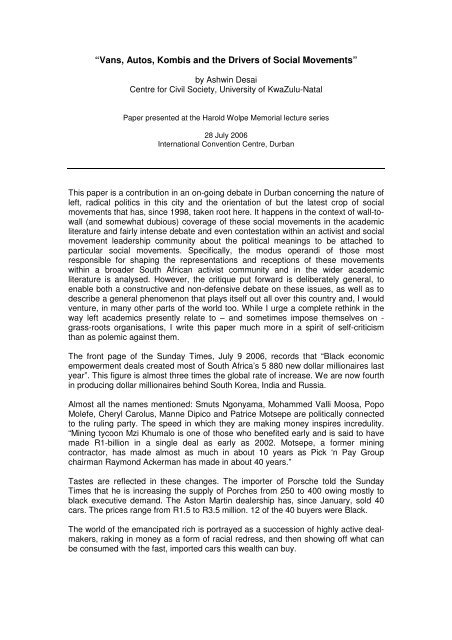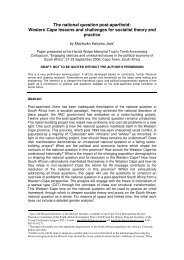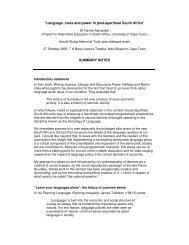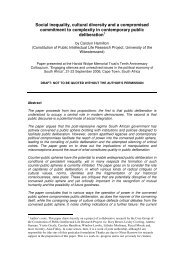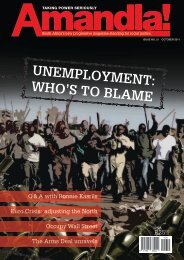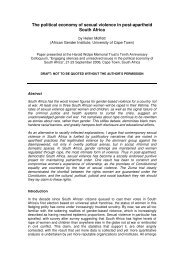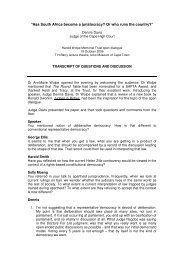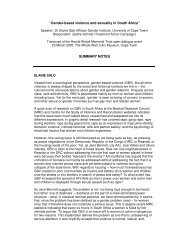âVans, Autos, Kombis and the Drivers of Social Movementsâ
âVans, Autos, Kombis and the Drivers of Social Movementsâ
âVans, Autos, Kombis and the Drivers of Social Movementsâ
Create successful ePaper yourself
Turn your PDF publications into a flip-book with our unique Google optimized e-Paper software.
“Vans, <strong>Autos</strong>, <strong>Kombis</strong> <strong>and</strong> <strong>the</strong> <strong>Drivers</strong> <strong>of</strong> <strong>Social</strong> Movements”<br />
by Ashwin Desai<br />
Centre for Civil Society, University <strong>of</strong> KwaZulu-Natal<br />
Paper presented at <strong>the</strong> Harold Wolpe Memorial lecture series<br />
28 July 2006<br />
International Convention Centre, Durban<br />
This paper is a contribution in an on-going debate in Durban concerning <strong>the</strong> nature <strong>of</strong><br />
left, radical politics in this city <strong>and</strong> <strong>the</strong> orientation <strong>of</strong> but <strong>the</strong> latest crop <strong>of</strong> social<br />
movements that has, since 1998, taken root here. It happens in <strong>the</strong> context <strong>of</strong> wall-towall<br />
(<strong>and</strong> somewhat dubious) coverage <strong>of</strong> <strong>the</strong>se social movements in <strong>the</strong> academic<br />
literature <strong>and</strong> fairly intense debate <strong>and</strong> even contestation within an activist <strong>and</strong> social<br />
movement leadership community about <strong>the</strong> political meanings to be attached to<br />
particular social movements. Specifically, <strong>the</strong> modus oper<strong>and</strong>i <strong>of</strong> those most<br />
responsible for shaping <strong>the</strong> representations <strong>and</strong> receptions <strong>of</strong> <strong>the</strong>se movements<br />
within a broader South African activist community <strong>and</strong> in <strong>the</strong> wider academic<br />
literature is analysed. However, <strong>the</strong> critique put forward is deliberately general, to<br />
enable both a constructive <strong>and</strong> non-defensive debate on <strong>the</strong>se issues, as well as to<br />
describe a general phenomenon that plays itself out all over this country <strong>and</strong>, I would<br />
venture, in many o<strong>the</strong>r parts <strong>of</strong> <strong>the</strong> world too. While I urge a complete rethink in <strong>the</strong><br />
way left academics presently relate to – <strong>and</strong> sometimes impose <strong>the</strong>mselves on -<br />
grass-roots organisations, I write this paper much more in a spirit <strong>of</strong> self-criticism<br />
than as polemic against <strong>the</strong>m.<br />
The front page <strong>of</strong> <strong>the</strong> Sunday Times, July 9 2006, records that “Black economic<br />
empowerment deals created most <strong>of</strong> South Africa’s 5 880 new dollar millionaires last<br />
year”. This figure is almost three times <strong>the</strong> global rate <strong>of</strong> increase. We are now fourth<br />
in producing dollar millionaires behind South Korea, India <strong>and</strong> Russia.<br />
Almost all <strong>the</strong> names mentioned: Smuts Ngonyama, Mohammed Valli Moosa, Popo<br />
Molefe, Cheryl Carolus, Manne Dipico <strong>and</strong> Patrice Motsepe are politically connected<br />
to <strong>the</strong> ruling party. The speed in which <strong>the</strong>y are making money inspires incredulity.<br />
“Mining tycoon Mzi Khumalo is one <strong>of</strong> those who benefited early <strong>and</strong> is said to have<br />
made R1-billion in a single deal as early as 2002. Motsepe, a former mining<br />
contractor, has made almost as much in about 10 years as Pick ‘n Pay Group<br />
chairman Raymond Ackerman has made in about 40 years.”<br />
Tastes are reflected in <strong>the</strong>se changes. The importer <strong>of</strong> Porsche told <strong>the</strong> Sunday<br />
Times that he is increasing <strong>the</strong> supply <strong>of</strong> Porches from 250 to 400 owing mostly to<br />
black executive dem<strong>and</strong>. The Aston Martin dealership has, since January, sold 40<br />
cars. The prices range from R1.5 to R3.5 million. 12 <strong>of</strong> <strong>the</strong> 40 buyers were Black.<br />
The world <strong>of</strong> <strong>the</strong> emancipated rich is portrayed as a succession <strong>of</strong> highly active dealmakers,<br />
raking in money as a form <strong>of</strong> racial redress, <strong>and</strong> <strong>the</strong>n showing <strong>of</strong>f what can<br />
be consumed with <strong>the</strong> fast, imported cars this wealth can buy.
Harold Wolpe lecture series, 28 July 2006, Durban<br />
But it is not <strong>the</strong> driving habits, nor <strong>the</strong> vehicles <strong>of</strong> <strong>the</strong> business class that I am going<br />
to focus on in this paper. There are o<strong>the</strong>r elites who live in as conspicuous <strong>and</strong><br />
parasitic a relationship to <strong>the</strong> constituency <strong>the</strong>y represent.<br />
The following week in <strong>the</strong> Sunday Times, <strong>the</strong> newspaper focused on poverty, albeit<br />
on page 5. Eleven million <strong>of</strong> <strong>the</strong> poor subsist on tiny social grants. The level <strong>of</strong> misery<br />
in rural <strong>and</strong> urban shackl<strong>and</strong>s is devastating. Although <strong>the</strong> article was sympa<strong>the</strong>tic to<br />
<strong>the</strong>ir plight, <strong>the</strong> poor were still portrayed as living no-hope lives, evincing no agency<br />
<strong>of</strong> <strong>the</strong>ir own. Nothing was said about how <strong>the</strong> poor are organizing, <strong>the</strong> dem<strong>and</strong>s <strong>the</strong>y<br />
are making <strong>and</strong> how <strong>the</strong>y are collectively confronting <strong>the</strong> system that humiliates <strong>and</strong><br />
degrades <strong>the</strong>m. There was, in particular, no mention <strong>of</strong> <strong>the</strong> various social movements<br />
that have sprung up or <strong>the</strong> sheer number <strong>of</strong> service delivery protests that have taken<br />
place <strong>the</strong>se last few years; one for every new dollar millionaire. There was certainly<br />
no investigation into <strong>the</strong> mode <strong>of</strong> transport members <strong>of</strong> social movements used.<br />
Perhaps that was a good thing, for I fear what might have emerged had <strong>the</strong> journalist<br />
looked too closely into who presumed to be driving <strong>the</strong>se movements around, in <strong>the</strong><br />
vans, autos <strong>and</strong> kombis I will talk about a little later.<br />
In creating a capital friendly environment, <strong>the</strong> promise this government holds out is<br />
that business will create jobs <strong>and</strong> general prosperity. So, <strong>the</strong> poor are asked to suffer<br />
some short-term pain for long-term gain. However, notions <strong>of</strong> social citizenship<br />
predicated on access to <strong>the</strong> labour-market have failed miserably throughout <strong>the</strong><br />
global South. All that has happened is that a small business class has accumulated<br />
fabulous wealth while, in a fine calculus that uses as its base <strong>the</strong> insignificant income<br />
transfers given to Blacks under apar<strong>the</strong>id, <strong>the</strong> democratic state now “progressively”<br />
rolls out slightly less trifling social grants that are just improvement enough to ward<br />
<strong>of</strong>f mass social discontent.<br />
This brings me to <strong>the</strong> subject <strong>of</strong> social movements. Much <strong>of</strong> this mass social<br />
discontent, potentially on a revolutionary line <strong>of</strong> flight pointed beyond this political<br />
economy, is mobilized by <strong>the</strong> many community organizations we have seen being<br />
born. Scattered, slightly dislocated <strong>and</strong> with varying underst<strong>and</strong>ings <strong>of</strong> <strong>the</strong> reasons<br />
<strong>the</strong>y are still marginalised after uhuru, <strong>the</strong>se social movements are never<strong>the</strong>less<br />
extremely militant <strong>and</strong> well rooted within poor communities.<br />
Ironically, <strong>the</strong> most visible <strong>of</strong> <strong>the</strong>se movements are known not because <strong>of</strong> <strong>the</strong>ir<br />
militant interventions but because <strong>the</strong>y have attracted to <strong>the</strong>m supporters from a<br />
largely middle-class background who have broadly left-wing political commitments. In<br />
a phrase, <strong>the</strong>y have attracted ‘activists’ who seek to come in from <strong>the</strong> bitter cold <strong>of</strong><br />
<strong>the</strong> post-apar<strong>the</strong>id struggle l<strong>and</strong>scape to <strong>the</strong> new fires that are burning in<br />
communities. These activists bring a range <strong>of</strong> important skills, perspectives <strong>and</strong>,<br />
most <strong>of</strong> all, resources to assist in <strong>the</strong> development, representation <strong>and</strong> generalization<br />
<strong>of</strong> <strong>the</strong>se struggles. Celebratory academic papers are produced, books <strong>and</strong><br />
newspaper articles are written, court cases fought, money for busses, meetings,<br />
rallies <strong>and</strong> T-shirts raised.<br />
Unfortunately, <strong>the</strong>se activists also bring with <strong>the</strong>m certain infectious political<br />
diseases. Sometimes <strong>the</strong>y are out to recruit members for <strong>the</strong>ir ultra-left sect or<br />
political party. O<strong>the</strong>r times, as NGO workers who need to justify <strong>the</strong>ir existence, <strong>the</strong>y<br />
insert <strong>the</strong>mselves into struggles that may be written up in <strong>the</strong> next funding proposal.<br />
Still o<strong>the</strong>r times, one finds ambitious academics keen to distinguish <strong>the</strong>mselves by<br />
getting <strong>the</strong> inside research track on some or o<strong>the</strong>r exotic rebellion, whose nuances<br />
<strong>the</strong>y are best placed to enlighten <strong>the</strong>re fellows in <strong>the</strong> academy about, while ratcheting<br />
up publication kudos. And, <strong>the</strong>n lastly, one has <strong>the</strong> somewhat dated, free-floating,<br />
2
Vans, <strong>Autos</strong>, <strong>Kombis</strong> <strong>and</strong> <strong>the</strong> <strong>Drivers</strong> <strong>of</strong> <strong>Social</strong> Movements<br />
pr<strong>of</strong>essional revolutionaries who genuinely believe <strong>the</strong>y have something to add to<br />
<strong>the</strong>se struggles or, more accurately, that <strong>the</strong>se struggles have something to add to<br />
<strong>the</strong> course <strong>of</strong> <strong>the</strong> battles <strong>the</strong>y are already fighting. You see <strong>the</strong>m attending marches,<br />
doing political education, writing letters <strong>and</strong> articles in <strong>the</strong> press or providing strategic<br />
advice to movements that <strong>of</strong>ten need assistance on <strong>the</strong> legal, logistical or financial<br />
fronts.<br />
It is hard to think <strong>of</strong> any social movement that has lasted longer than six-months in<br />
South Africa that does not have quite an impressive support crew made up <strong>of</strong> <strong>the</strong><br />
kinds <strong>of</strong> people I have just described. It is quite startling, <strong>the</strong>n, that while social<br />
movements have been studied to death, those outsiders who play such a powerful<br />
role have largely escaped serious scrutiny. But, before we look more closely at <strong>the</strong><br />
role <strong>of</strong> <strong>the</strong>se struggle-magi who come from outside affected communities bearing<br />
gold, frankincense <strong>and</strong> myrrh, let us first consider why indeed <strong>the</strong>y are thought <strong>of</strong> as<br />
being on <strong>the</strong> outside in <strong>the</strong> first place.<br />
Unlike <strong>the</strong> anti-apar<strong>the</strong>id struggle to which people from varying backgrounds became<br />
committed as much for ideological reasons as for reasons rooted in <strong>the</strong>ir own<br />
experiences <strong>of</strong> oppression, most members <strong>of</strong> social movements are said to be<br />
mobilized predominantly by <strong>the</strong>ir experiences <strong>of</strong> deprivation. Yes, ideology is<br />
wrapped up in taking on struggles for everyday survival. And yes, ideology certainly<br />
breeds <strong>and</strong> develops as <strong>the</strong>se struggles unfold. However, even after months <strong>of</strong><br />
collective struggle, <strong>the</strong> over-arching qualification for comradeship based on a<br />
commitment to a set <strong>of</strong> society-wide ideas (such as non-racialism, democracy or<br />
revolution) is not <strong>the</strong> glue that sticks one comrade to ano<strong>the</strong>r in social movements. It<br />
is ra<strong>the</strong>r a commitment to a set <strong>of</strong> particular dem<strong>and</strong>s <strong>and</strong> a commitment to an<br />
organizational identity created to achieve <strong>the</strong>m. Legitimate, public <strong>and</strong> democratic<br />
interactions between all <strong>of</strong> us in social movements, certainly in Durban in my<br />
experience, centre around <strong>the</strong> achievement <strong>of</strong> <strong>the</strong>se dem<strong>and</strong>s <strong>and</strong> <strong>the</strong> building <strong>of</strong> <strong>the</strong><br />
organizations <strong>and</strong> leaders deemed necessary to do so.<br />
Put differently, <strong>the</strong> basis for our communion is to dem<strong>and</strong> delivery or oppose policy.<br />
In this process, a comrade is a comrade mainly because he or she is a fellow<br />
“resident” who shares our immediate goals <strong>and</strong> inhabits our organisation. However,<br />
we lack a latter day substitute for <strong>the</strong> term “revolutionary” to describe affinities <strong>and</strong><br />
principles <strong>of</strong> desire <strong>and</strong> consciousness that go beyond <strong>the</strong>se horizons <strong>and</strong> attach to<br />
people <strong>and</strong> groups with whom we share capacities for subversion not defined by a<br />
reaction to specific government policies. Until we find such a language <strong>and</strong> such a<br />
politics, those people who are not directly affected by water cut-<strong>of</strong>fs or slumclearance<br />
for instance (or indeed our water cut-<strong>of</strong>fs <strong>and</strong> our slum-clearances) - are<br />
by <strong>the</strong> very constitution <strong>and</strong> imagination <strong>of</strong> social movements - necessarily, outsiders.<br />
As a consequence <strong>of</strong> <strong>the</strong> way social movements are imagined, we have not<br />
developed a grammar <strong>of</strong> power that those outside social movements can use to talk<br />
to those within. Nor do those inside have a way <strong>of</strong> coming to grips with <strong>the</strong> ways <strong>of</strong><br />
outside activists or with o<strong>the</strong>r social movements beyond <strong>the</strong>m. Indeed, <strong>the</strong> crudeness<br />
<strong>of</strong> <strong>the</strong> distinction between “insiders” <strong>and</strong> “outsiders” is created by <strong>the</strong> absence <strong>of</strong><br />
words <strong>and</strong> ideas describing levels <strong>of</strong> action, experience <strong>and</strong> thought where insiders<br />
<strong>and</strong> outsiders act as one, or where <strong>the</strong> roles are reversed. We end up using <strong>the</strong>n a<br />
rough sign language to communicate what we expect <strong>the</strong> o<strong>the</strong>r wants to see in us.<br />
Outsiders are cooperative, sympa<strong>the</strong>tic <strong>and</strong> resourceful. Insiders, charismatic, wise<br />
<strong>and</strong> strong. Leaders from o<strong>the</strong>r communities are respectful, friendly <strong>and</strong> efficient at<br />
bringing a kombi or two <strong>of</strong> support. This has been a very useful vocabulary up until<br />
now. But, for ei<strong>the</strong>r outsiders or insiders to underst<strong>and</strong>, evaluate, debate <strong>and</strong><br />
3
Harold Wolpe lecture series, 28 July 2006, Durban<br />
generate ideas or meanings beyond <strong>the</strong> tactical exigencies <strong>of</strong> <strong>the</strong> moment is rare in<br />
this language.<br />
There are those who say that this is as it should be. I agree with <strong>the</strong>m to <strong>the</strong> extent<br />
that <strong>the</strong> imposition <strong>of</strong> tired left dogmas <strong>and</strong> underst<strong>and</strong>ings <strong>of</strong> power are no good.<br />
But, <strong>the</strong>re is a distinct difference between mobilizing against <strong>the</strong> state according to<br />
stale, pre-determined programs <strong>and</strong> <strong>the</strong> task <strong>of</strong> provoking, contesting, enabling <strong>and</strong><br />
generating a collective, universalising ideology <strong>of</strong> community that increasingly<br />
separates itself from <strong>the</strong> logic <strong>and</strong> reach <strong>of</strong> <strong>the</strong> state. I think here <strong>of</strong> <strong>the</strong> difference<br />
between movements that are able to make “stealing” water or “invading” l<strong>and</strong> part <strong>of</strong><br />
<strong>the</strong>ir everyday praxis or discourses as opposed to decrying lack <strong>of</strong> delivery.<br />
This is not to say that ideological ascriptions <strong>and</strong> strategic programs do not attach<br />
<strong>the</strong>mselves to social movements. They do. But it is very seldom a self - or -<br />
collectively fashioned event. Perhaps by <strong>the</strong> default <strong>of</strong> <strong>the</strong> insiders, this task <strong>of</strong><br />
fashioning political meanings that flow from struggles has largely been taken up by<br />
<strong>the</strong> outsiders. It is this “outsider” grouping, who most furiously contest what particular<br />
social movements mean ideologically, technically, even cynically, among <strong>the</strong>mselves.<br />
These battles sometimes play <strong>the</strong>mselves out on <strong>the</strong> bodies <strong>and</strong> campaigns <strong>of</strong> social<br />
movements as various academics try to position social movements to best achieve<br />
<strong>the</strong>ir vision. At <strong>the</strong> same time, social movements are incessantly studied <strong>and</strong><br />
analysed so that factual support for particular <strong>the</strong>oretical claims academics have<br />
made about <strong>the</strong>m can, like any easy victory, be piously claimed.<br />
This can become ethically quite complex <strong>and</strong>, in certain extreme cases, treacherous.<br />
At this very conference, we have had papers presented where <strong>the</strong> statements <strong>of</strong><br />
named comrades made in <strong>the</strong> privileged environment <strong>of</strong> recent social movement<br />
caucuses have been deconstructed as signifying this or that new turn in <strong>the</strong>ir politics.<br />
I have my doubts about <strong>the</strong> substance <strong>of</strong> this reasoning but, even were it to be valid<br />
<strong>and</strong> interesting, <strong>the</strong>re is something galling about information garnered by an<br />
academic while posing as a comrade being used to demonstrate a point in an<br />
abstruse sociology paper about <strong>the</strong> level <strong>of</strong> development <strong>of</strong> his fellow activists.<br />
Please underst<strong>and</strong>, this is not a quibble <strong>of</strong> sociological ethics but one <strong>of</strong> political<br />
morality <strong>and</strong> comradeship. It is a r<strong>and</strong>om crowd at a conference that is being taken<br />
into such a researcher’s confidence about what he really thinks about <strong>the</strong> politics <strong>and</strong><br />
ideas <strong>of</strong> people who are under <strong>the</strong> impression that he is <strong>the</strong>ir comrade, when <strong>the</strong>y<br />
<strong>the</strong>mselves are simply not treated with <strong>the</strong> same level <strong>of</strong> sincerity or depth <strong>of</strong><br />
engagement.<br />
The time has now come to ask. While we outside academics are researching <strong>the</strong><br />
practices <strong>and</strong> analyzing <strong>the</strong> politics <strong>of</strong> <strong>the</strong> poor, who is researching us, <strong>the</strong><br />
researchers Surely, we must continue to develop our ideas about society <strong>and</strong><br />
struggle but why always circulate <strong>the</strong>se ideas in a separate world from those who<br />
inspire us <strong>and</strong> about whom we write. This behaviour is expected from those who<br />
claim only to be researchers <strong>and</strong> nothing else, who are up-front with <strong>the</strong>ir<br />
questionnaires. But it rankles when more gr<strong>and</strong>iose claims <strong>of</strong> membership <strong>of</strong> <strong>the</strong>se<br />
movements are made.<br />
And what exactly is it okay to write about Is it not patronizing to presume to label <strong>the</strong><br />
politics <strong>of</strong> those we consort with in struggle in academic texts but not to engage <strong>the</strong>m<br />
in an exchange <strong>of</strong> ideas over <strong>the</strong>se same issues What are our rules <strong>of</strong> engagement<br />
with communities who some <strong>of</strong> us are quite literally feeding <strong>of</strong>f, in a world undeclared<br />
to <strong>the</strong>m I do not mean to single out a particular example <strong>of</strong> this practice unfairly by<br />
asking this question, because this mode <strong>of</strong> conduct is widespread <strong>and</strong> few<br />
academics are exempt from criticism. But, what it does reveal is a general truism that<br />
4
Vans, <strong>Autos</strong>, <strong>Kombis</strong> <strong>and</strong> <strong>the</strong> <strong>Drivers</strong> <strong>of</strong> <strong>Social</strong> Movements<br />
is alarming. The actual constituency to which even <strong>the</strong> most radical academics are<br />
beholden are not <strong>the</strong> poors. Nor is it <strong>the</strong> singular middle-class. Ra<strong>the</strong>r it is <strong>the</strong> mass<br />
<strong>of</strong> <strong>the</strong>m ga<strong>the</strong>red in conferences, journals, e-mail lists, universities <strong>and</strong> o<strong>the</strong>r sites <strong>of</strong><br />
<strong>the</strong> production <strong>of</strong> bourgeois knowledge.<br />
And since <strong>the</strong>re can be very little benefit to community movements to be gleaned<br />
from such detailed <strong>and</strong> personal disclosures when weighed against <strong>the</strong> existential<br />
bad-faith <strong>of</strong> this gesture <strong>and</strong> <strong>the</strong> embarrassment it could occasion, one has to start<br />
thinking about setting some boundaries for <strong>the</strong> permanent scrutiny <strong>of</strong> one class <strong>of</strong><br />
comrades by ano<strong>the</strong>r caste <strong>of</strong> <strong>the</strong>m. This constant note-taking <strong>and</strong> reflection on<br />
those one joins in struggle cannot be healthy. It is one thing telling truth to power,<br />
colleagues. It is ano<strong>the</strong>r thing altoge<strong>the</strong>r letting out secrets <strong>and</strong> trespassing on <strong>the</strong><br />
dignity <strong>of</strong> those who let you into <strong>the</strong>ir space as a fellow traveller, not biographer. I am<br />
sorry to say this but this mode <strong>of</strong> knowledge production from private, semicl<strong>and</strong>estine<br />
<strong>and</strong> comradely spaces, for no agreed nor identifiable benefit to social<br />
movements, is only a few notches better than spying.<br />
But <strong>the</strong> most alarming feature <strong>of</strong> <strong>the</strong> current, general academic mode <strong>of</strong> reporting on<br />
social movements is that it is <strong>of</strong>ten so overblown, romanticized <strong>and</strong>, in many cases,<br />
just plain made up. It is actually difficult to read what is said about certain social<br />
movements with a straight face <strong>and</strong> one sometimes gets <strong>the</strong> impression that <strong>the</strong>y are<br />
written up especially to serve as substantiation for discombobulated chunks <strong>of</strong><br />
whichever new <strong>the</strong>orist it is chic to corroborate. We all inflate numbers to tell <strong>the</strong><br />
press about <strong>the</strong> size <strong>of</strong> our marches. But when we begin believing our own<br />
propag<strong>and</strong>a, a dangerous precipice awaits. It is a cliff over which many greater<br />
revolutionary subjects than social movements have lurched. At <strong>the</strong> bottom <strong>of</strong> this cliff<br />
lie <strong>the</strong> battered bodies <strong>of</strong> organizations <strong>and</strong> individuals who simply could not live up<br />
to <strong>the</strong> promises made on <strong>the</strong>ir behalf.<br />
The epitome <strong>of</strong> this mode <strong>of</strong> thinking is <strong>the</strong> facile axiom that <strong>the</strong> poor somehow are<br />
an embodiment <strong>of</strong> <strong>the</strong> truth <strong>and</strong>, as long as <strong>the</strong>y organise democratically, <strong>the</strong> line <strong>of</strong><br />
march <strong>the</strong>y take will advance <strong>the</strong> cause <strong>of</strong> freedom. As a corollary to this mistaken<br />
view, criticisms <strong>of</strong> existing social movements from outside is cast as arrogant,<br />
reckless, reactionary <strong>and</strong>, even, racist. In this regard, we have seen fairly gentle<br />
questionings around patriarchal attitudes in social movements responded to in near<br />
hysterical terms with labels, “white, middle-class, nor<strong>the</strong>rner” being used to put down<br />
<strong>the</strong> heresy that <strong>the</strong> poor are only human1.<br />
No. We do each o<strong>the</strong>r no favours by flattery dressed up as <strong>the</strong>ory. For, we are all<br />
much more compromised than we like to think <strong>and</strong> we should at least be clear about<br />
that among ourselves. Movements are much more precarious <strong>and</strong> turning a blind eye<br />
to <strong>the</strong>ir faults is dangerous <strong>and</strong> patronizing all at once. I think here <strong>of</strong> <strong>the</strong> concept <strong>of</strong><br />
recuperation. This, following Henri Lefebvre, is when<br />
“an idea or a project regarded as irredeemably revolutionary or subversive - that is to<br />
say, on <strong>the</strong> point <strong>of</strong> introducing a discontinuity - is normalized, reintegrated into <strong>the</strong><br />
existing order, <strong>and</strong> even revives it. Shaken for a brief moment, <strong>the</strong> social relations <strong>of</strong><br />
production <strong>and</strong> reproduction - that is to say, domination - are reinforced…The fact<br />
that a project or concept has been ‘recuperated’ does not mean that it was not<br />
potentially active for a period <strong>of</strong> time. It means that ‘people’ (<strong>the</strong> opponents <strong>of</strong> <strong>the</strong><br />
established order or disorder) did not know how, or were not able, to seize <strong>the</strong><br />
opportunity, <strong>the</strong> favourable conjuncture, <strong>and</strong> carry out <strong>the</strong> project.” (2005, pp. 105-<br />
106)<br />
5
Harold Wolpe lecture series, 28 July 2006, Durban<br />
Lefebvre <strong>the</strong>n goes on: “First point: what can be recuperated is not, by <strong>the</strong> same<br />
token, recuperative. Second point, which must be stressed: <strong>the</strong>re is nothing-no<br />
proposal, no project, no idea-which cannot be recuperated, that is to say, used by<br />
different social or political forces from those in whose name it was advanced.” (2005,<br />
106).<br />
So in <strong>the</strong> present conjuncture, <strong>the</strong> first thing we need to note is that every single<br />
existing social movement is right now, right here, perfectly recuperable. It is simply<br />
nonsense to talk <strong>the</strong>m up as <strong>the</strong> next revolutionary subject. There will not even be<br />
talk <strong>of</strong> “betrayal” should a government minister come, with cheque-book in h<strong>and</strong>, <strong>and</strong><br />
make an <strong>of</strong>fer h<strong>and</strong>some enough to relocate mjondolo residents to Verulam.<br />
The much trumpeted “right to live in <strong>the</strong> city” is no principled, ideological commitment.<br />
Nor does it have to be. But we have to realize <strong>and</strong> respect that <strong>the</strong> core dem<strong>and</strong> <strong>of</strong><br />
many social movements is indeed simply to be placed within “normal” relations <strong>of</strong><br />
oppression <strong>and</strong> exploitation: in a normal job, in an RDP house with minimum<br />
st<strong>and</strong>ards <strong>of</strong> electricity <strong>and</strong> water. We might have reasons to tell o<strong>the</strong>r people<br />
o<strong>the</strong>rwise (although, I can’t see what <strong>the</strong>se reasons are) but we ought not to mislead<br />
ourselves. And we should not use <strong>the</strong> poor to satisfy our peculiar (intellectual)<br />
fetishes.<br />
Second, <strong>the</strong>re is a warning that <strong>the</strong>re is no movement, no set <strong>of</strong> ideas that can never<br />
be recuperated, hi-jacked <strong>and</strong> made to serve <strong>the</strong> interests <strong>of</strong> <strong>the</strong> few, <strong>of</strong> an elite. We<br />
have seen how an increase in Black millionaires <strong>and</strong> <strong>the</strong> fancy cars <strong>the</strong>y drive is<br />
represented as a sign <strong>of</strong> <strong>the</strong> success <strong>of</strong> <strong>the</strong> anti-apar<strong>the</strong>id struggle. We also have<br />
those in our midst who plainly want power for <strong>the</strong>mselves to serve <strong>the</strong>ir own<br />
inclinations <strong>and</strong> needs. So, those <strong>of</strong> you here who have built an incredible movement<br />
<strong>of</strong> <strong>the</strong> Poors need to find ways in which that cannot happen.<br />
This brings me to ano<strong>the</strong>r feature <strong>of</strong> those who purport to help community<br />
movements. There is a tiny but impressive literature on <strong>the</strong> way in which social<br />
movements become dependent on funders, NGOs, researchers, middle-class<br />
supporters <strong>and</strong> even legal representatives. What is almost never written up is <strong>the</strong> role<br />
that those who make <strong>the</strong>se telling <strong>and</strong> necessary critiques come to play in<br />
movements precisely because <strong>of</strong> <strong>the</strong> trust <strong>the</strong>y have purchased by denouncing<br />
o<strong>the</strong>rs like <strong>the</strong>m. It’s an old trick. The white person who condemns racism <strong>the</strong> loudest<br />
<strong>and</strong> with <strong>the</strong> greatest zealousness, <strong>of</strong>ten succeeds in having his or her own racism<br />
go unchallenged. I certainly agree that it is necessary to decry vanguardism but <strong>the</strong>re<br />
comes a point where denouncing outside influence or leadership is worse than<br />
vanguardism. It is just gate-keeping: vanguardism without ideology, without strategy.<br />
Nietzsche said that “<strong>the</strong> truth is who gets <strong>the</strong>re first”. It seems that <strong>the</strong> evil<br />
vanguardists are, by definition, those who get <strong>the</strong>re second.<br />
I make <strong>the</strong> following comments in a constructive manner. I do not mean to attack or<br />
chastise any particular individuals. To some extent, we are all guilty <strong>of</strong> elements <strong>of</strong><br />
<strong>the</strong> conduct I am about to describe <strong>and</strong> I would like what I say to be seen in <strong>the</strong> light<br />
<strong>of</strong> auto-critique. However, having said that, <strong>the</strong> time has come to very seriously warn<br />
about <strong>the</strong> individual intellectual who claims membership <strong>of</strong> <strong>the</strong> movement, but still<br />
operates above <strong>and</strong> beyond its purview in his or her dealings with o<strong>the</strong>r intellectuals<br />
or activists. In my own experience <strong>of</strong> this position <strong>the</strong>se intellectuals are quite<br />
vociferous about democratic practice <strong>and</strong> denounce all those who claim in any way to<br />
represent <strong>the</strong> movements but who are not integrally part <strong>of</strong> <strong>the</strong>m. However, <strong>the</strong>y are<br />
quite happy to write academic papers analyzing <strong>the</strong> movements <strong>and</strong> <strong>the</strong>ir leaders in<br />
great detail, take international speaking engagements that centre around <strong>the</strong><br />
community movements, <strong>and</strong> demonstrate <strong>the</strong>ir dominance over fellow intellectuals<br />
6
Vans, <strong>Autos</strong>, <strong>Kombis</strong> <strong>and</strong> <strong>the</strong> <strong>Drivers</strong> <strong>of</strong> <strong>Social</strong> Movements<br />
not by means <strong>of</strong> better arguments but with reference to what <strong>the</strong> poor really want or<br />
what is really good for <strong>the</strong>m.<br />
Strangely, when things in democratic spaces go against <strong>the</strong>m, such academics are<br />
not immune to composing private caucuses <strong>and</strong> having one-on-one, I guess <strong>the</strong>y<br />
would call it, “political-education sessions” with key leaders. Here <strong>the</strong> prestige <strong>the</strong>y<br />
enjoy as academics gives <strong>the</strong>m an unelected power many elected leaders <strong>of</strong> <strong>the</strong><br />
movement could never dream <strong>of</strong> exercising over idea production. In all <strong>of</strong> this, <strong>the</strong>re<br />
is a vast, bad-faith tale <strong>of</strong> monumental, hat-swapping to be told. When, in one role,<br />
disputes erupt on <strong>the</strong> e-mail with fellow middle-class activists or academics, <strong>the</strong>y are<br />
content to assume <strong>the</strong> role <strong>of</strong> outside commentators while <strong>the</strong>y ascribe a range <strong>of</strong><br />
qualities to <strong>the</strong> movements that have obviously been subjected to no authorization by<br />
<strong>the</strong> movements <strong>the</strong>mselves. However, as <strong>the</strong>se disputes develop, <strong>the</strong>y come to claim<br />
a far greater affiliation with <strong>the</strong> movements. To question <strong>the</strong> position <strong>the</strong>y put or <strong>the</strong><br />
(exaggerated) claims <strong>the</strong>y make is presented as an attack on <strong>the</strong> organization itself.<br />
The problem here, comrades, is grave. It verges on thuggery.<br />
All <strong>the</strong> while, <strong>the</strong>se academics rail against vanguardism. And so, while berating<br />
people about <strong>the</strong> fact that community activists have no e-mail, <strong>the</strong>y see no reason,<br />
for instance, to share information with community members. Although, this last<br />
statement is not entirely accurate. They do share those e-mails that cast <strong>the</strong>ir fellow<br />
academics <strong>and</strong> activists in a bad light with <strong>the</strong> leaders <strong>of</strong> social movements. This<br />
style <strong>of</strong> operation does not protect social movements. It pimps <strong>the</strong>m. It passes<br />
gossip, megalomania <strong>and</strong> abuse <strong>of</strong>f as politics <strong>and</strong> introduces people to <strong>the</strong> most<br />
degraded form <strong>of</strong> intellectual engagement. I should know. I’ve done it myself.<br />
I gave a lift to a few community activists recently <strong>and</strong> asked <strong>the</strong>m what <strong>the</strong>y thought<br />
about <strong>the</strong> recent SACP critique <strong>of</strong> <strong>the</strong> ANC. They had never been given any<br />
information on this but were incredibly excited. It is a trend. I asked <strong>the</strong>m (all in<br />
leadership) whe<strong>the</strong>r anyone in <strong>the</strong> academy had circulated <strong>the</strong> texts that inform <strong>the</strong><br />
way <strong>the</strong>y are written up by <strong>the</strong>se academics, such as Biko’s “I Write What I Like”.<br />
This had not occurred. I find this strange. While <strong>the</strong> politics <strong>of</strong> <strong>the</strong> poor are celebrated<br />
as enunciating features <strong>of</strong> this great book, it seems that as far as <strong>the</strong> poor<br />
<strong>the</strong>mselves go, for <strong>the</strong> academics it is a question <strong>of</strong>, “They will Read what I like”.<br />
It is not as if <strong>the</strong>se academics cannot muster intellectual support for <strong>the</strong>ir style <strong>of</strong><br />
operation. One can find a verse in <strong>the</strong> Bible for anything. And <strong>the</strong>ir Bibles, comm<strong>and</strong><br />
that <strong>the</strong> Poor embody <strong>the</strong> truth. Therefore <strong>the</strong> Poor must be kept in some kind <strong>of</strong><br />
quarantine. Adorno’s admonition comes to mind: “In <strong>the</strong> end glorification <strong>of</strong> splendid<br />
underdogs is nothing o<strong>the</strong>r than glorification <strong>of</strong> <strong>the</strong> splendid system that makes <strong>the</strong>m<br />
so”. As I have said above, this view occasions a massive romanticisation <strong>of</strong> <strong>the</strong><br />
condition <strong>of</strong> wretchedness; not <strong>the</strong> economic position, but <strong>the</strong> existential one it<br />
supposedly produces. Reading over some <strong>of</strong> <strong>the</strong> newspaper writing on social<br />
movements that has recently been produced, I was struck by <strong>the</strong> lurid, almost loving<br />
evocation <strong>of</strong> <strong>the</strong> condition <strong>of</strong> wretchedness. It is impossible to miss <strong>the</strong> obvious pity<br />
that is openly evoked. And I began thinking about an interview with Faizal Devji,<br />
author <strong>of</strong> <strong>the</strong> L<strong>and</strong>scape <strong>of</strong> <strong>the</strong> Jihad, which, despite its faults, makes an interesting<br />
point about activists driven more by pity than political conviction or ambition:<br />
“Pity can be dangerous, precisely because one is not personally involved in <strong>the</strong><br />
suffering. One is acting, apparently, on behalf <strong>of</strong> o<strong>the</strong>rs. You see this among leftist<br />
groups today, as well. It's vicarious, it's luxurious in a way, <strong>and</strong> luxuriant; it is also<br />
narcissistic. It is a very dangerous <strong>and</strong> bitter passion.”<br />
7
Harold Wolpe lecture series, 28 July 2006, Durban<br />
Devji was criticizing suicide bombers, perhaps a bit unfairly, because at least <strong>the</strong>y lay<br />
down <strong>the</strong>ir life in pity. But when one’s lavish praxis <strong>of</strong> pity advances your career, puts<br />
your name up in lights while you live <strong>and</strong> thrive, I lose all respect for this bitter,<br />
calculated passion.<br />
The last aspect <strong>of</strong> <strong>the</strong> way in which <strong>the</strong>se intellectuals operate that I am going to look<br />
at tonight is <strong>the</strong> way <strong>the</strong>y ensure dominance through cultivating a couple <strong>of</strong> leaders.<br />
A subtle kind <strong>of</strong> patronage emerges in this relationship. A dependence. This<br />
relationship, <strong>of</strong> course, helps <strong>the</strong> leaders because <strong>the</strong>y are <strong>the</strong>n <strong>the</strong> conduits <strong>of</strong><br />
transport, t-shirts <strong>and</strong> access to outside events. In this transaction it is never in <strong>the</strong><br />
interests <strong>of</strong> <strong>the</strong> academics to universalize <strong>the</strong> crisis or have too wide dealings with<br />
o<strong>the</strong>r intellectuals for that might mean losing <strong>the</strong>ir ‘control’ over <strong>the</strong>ir fiefdoms. And<br />
so, when tentacles <strong>of</strong> outside help <strong>and</strong> solidarity are put out by o<strong>the</strong>r formations, it is<br />
resented <strong>and</strong> sl<strong>and</strong>ered by <strong>the</strong>m, <strong>and</strong> if it were up to <strong>the</strong>se intellectuals, such contact<br />
would be cut-<strong>of</strong>f. A consistent <strong>the</strong>me <strong>of</strong> <strong>the</strong>ir politics is to seek various justifications to<br />
keep <strong>the</strong> gates to <strong>the</strong>ir desperate Eden locked shut.<br />
For years, I have been quoting Said, that <strong>the</strong> craft <strong>of</strong> <strong>the</strong> intellectual is critique. To<br />
talk truth to power. I am afraid, it is no longer enough to talk truth to power. One must<br />
also talk truth within <strong>the</strong> disempowered. There is simply too much at stake to do<br />
o<strong>the</strong>rwise. Ironically, <strong>the</strong>se intellectuals who have made a name for <strong>the</strong>mselves in <strong>the</strong><br />
academy from <strong>the</strong>ir articles on your movements are involved in an anti-intellectualism<br />
for <strong>the</strong>y keep saying that <strong>the</strong> poor are only interested in <strong>the</strong>ir immediate interests. So,<br />
<strong>the</strong> poor must not worry <strong>the</strong>mselves about broader issues. Vanguardism is married to<br />
a narrow form <strong>of</strong> autonomism, minus politics. I think Zizek was on to something when<br />
he held that those who refuse to universalize a particular experience or political<br />
argument, ultimately is involved in a “conservative political gesture: ultimately<br />
everyone can evoke his unique experience in order to justify his reprehensible acts.”<br />
And so this idea for intellectuals from <strong>the</strong> academy to be so organically involved,<br />
while lauded in some quarters (<strong>of</strong>ten by <strong>the</strong>mselves) I think requires much greater<br />
scrutiny. And I would really like to encourage you to debate this within your ranks just<br />
as I think, all <strong>of</strong> us, <strong>the</strong> so-called academics or city-people, should have a proper<br />
debate about <strong>the</strong> way we have related to you. You are more than welcome, if it were<br />
up to me, to participate in this debate. Come <strong>and</strong> research us. Come <strong>and</strong> observe<br />
how we operate on our terrain.<br />
Some <strong>of</strong> <strong>the</strong> things we need to consider are structural. What role do <strong>the</strong> so-called<br />
city-people play Is it not time that, to foster some accountabilities, we ourselves<br />
form a grouping If not, what is our role in social movements while we pursue our<br />
plainly, self-interested academic careers that <strong>of</strong>ten have <strong>the</strong> ladder to success<br />
composed <strong>of</strong> your limbs. Should we compose an activist forum with explicit political<br />
ideas to which anyone, including those in community movements, can be joined if<br />
<strong>the</strong>y like Or, do we withdraw into a proper respectful, arm’s length resource <strong>and</strong><br />
research role What is this SMI that we are now supposedly all part <strong>of</strong> If a KZN<br />
branch exists, is it open to participation only to those who have a mass behind <strong>the</strong>m<br />
or is it a cty-wide co-ordinating committee What is <strong>the</strong> status <strong>of</strong> political parties<br />
And do we make certain strategic moves in reaching out to social forces such as<br />
Cosatu <strong>and</strong> <strong>the</strong> SACP that seem similarly discontent with neo-liberal rule A lot <strong>of</strong><br />
questions that we need to take seriously if our partnership is going to last.<br />
To link up with <strong>the</strong> title <strong>of</strong> this paper, how do we keep from having our vans driven for<br />
us by vanguardists How do we universalize our particular experiences without<br />
having our auto’s sabotaged from ever leaving our areas by some autonomists And,<br />
how do we avoid our movements becoming populist kombi’s where anyone can jump<br />
8
Vans, <strong>Autos</strong>, <strong>Kombis</strong> <strong>and</strong> <strong>the</strong> <strong>Drivers</strong> <strong>of</strong> <strong>Social</strong> Movements<br />
in no matter <strong>the</strong>ir politics, for us to be taken as a passive mass to <strong>the</strong> next march In<br />
o<strong>the</strong>r words, how do we find a vehicle which is responsive to our collective,<br />
principled, radical direction<br />
For, while I might have sounded critical <strong>of</strong> <strong>the</strong> movements <strong>of</strong> <strong>the</strong> poors that have<br />
arisen <strong>and</strong> sceptical <strong>of</strong> <strong>the</strong> motives <strong>and</strong> methods <strong>of</strong> those who have helped build<br />
<strong>the</strong>m, I do recognize <strong>the</strong> enormous, potent energies sizzling within social movements<br />
<strong>and</strong> I tip my hat to those who have done <strong>the</strong> grinding, punishing work to get where<br />
we are. The movements <strong>of</strong> <strong>the</strong> poor in South Africa are indeed to be celebrated <strong>and</strong><br />
praised. Not for being what <strong>the</strong>y are not: embodiments <strong>of</strong> <strong>the</strong>oretical abstractions <strong>and</strong><br />
fine-sounding phrases in sociological literature. No, <strong>the</strong> movements <strong>of</strong> <strong>the</strong> poor must<br />
be celebrated for being what <strong>the</strong>y are: relatively small groupings <strong>of</strong> awakening<br />
antagonism in a sea <strong>of</strong> political apathy, nationalist ignorance <strong>and</strong> informal repression.<br />
Groupings that are imperfectly but honestly grappling with <strong>the</strong> difficulties <strong>of</strong><br />
campaigning against <strong>the</strong> policies <strong>of</strong> an ANC run state. Led by people who must hold<br />
down poorly-paying jobs, or look after children, or care for those dying <strong>of</strong> Aids by day<br />
<strong>and</strong>, at night, feel <strong>the</strong>ir way through political minefields in meetings held in dangerous<br />
places, with insufficient information, all <strong>the</strong> while giving heart to o<strong>the</strong>rs who secretly<br />
sometimes feel as vulnerable <strong>and</strong> unsure as <strong>the</strong>y do. And this is not to speak <strong>of</strong> <strong>the</strong><br />
lure <strong>of</strong> taking <strong>of</strong>fice or giving up, <strong>the</strong> stress <strong>of</strong> criticism <strong>and</strong> <strong>the</strong> risk <strong>of</strong> alienating those<br />
<strong>the</strong>y need to keep on board <strong>the</strong> broader struggle.<br />
The fact that you have built <strong>the</strong>se durable, potent <strong>and</strong> inspiring organizations that<br />
everyone - from academics, to <strong>the</strong> readers <strong>of</strong> You <strong>and</strong> Drum magazines, to activists<br />
in o<strong>the</strong>r cities <strong>and</strong> countries, even to <strong>the</strong> Minister <strong>of</strong> Intelligence - is talking about is<br />
breathtaking. And <strong>the</strong> fact that this has been achieved even while you are not pure<br />
<strong>and</strong> have made mistakes <strong>and</strong> found your feet, makes your achievement all <strong>the</strong> more<br />
heroic than if you were somehow programmed by your class position to turn out<br />
good. Despite <strong>the</strong> misbehaviour, from time to time, <strong>of</strong> <strong>the</strong> activist set, you have also<br />
been incredibly generous in your dealings with us.<br />
It works both ways <strong>and</strong> out <strong>of</strong> our interactions a new idea <strong>of</strong> a political community is<br />
emerging that has <strong>the</strong> capacity to do dramatic things in <strong>the</strong> present South African<br />
ideological l<strong>and</strong>scape. In fact, <strong>the</strong> l<strong>and</strong>less, <strong>the</strong> ‘squatters’, those without basic<br />
services are potentially <strong>the</strong> thick end <strong>of</strong> <strong>the</strong> wedge that is being driven in our society<br />
at this moment by crime, riot <strong>and</strong> <strong>the</strong> Zuma Affair. To perhaps move to ano<strong>the</strong>r stage,<br />
we must recognize that we have all been pr<strong>of</strong>oundly shaped by our interactions with<br />
each o<strong>the</strong>r <strong>and</strong> with activists <strong>and</strong> fellow comrades who have joined along <strong>the</strong> way<br />
<strong>and</strong> to blink or fixate on our own supposed “purity” right now will be tragic.<br />
I believe we make quite a team, despite <strong>the</strong> problems that are emerging <strong>and</strong> must be<br />
dealt with now. Yes, <strong>the</strong>re are many pitfalls to dodge <strong>and</strong> disagreements still to settle.<br />
And we must constantly re-evaluate <strong>the</strong> basis <strong>of</strong> our contact with each o<strong>the</strong>r. But, I<br />
don’t think anyone will disagree that <strong>the</strong> movements <strong>of</strong> <strong>the</strong> poor here in Durban <strong>and</strong><br />
all those who have built <strong>the</strong>m have quite literally shown <strong>the</strong> way.<br />
Hopefully, those middle-class women <strong>and</strong> men who have troubled you so can meet<br />
<strong>the</strong> challenge <strong>of</strong> how to support movements <strong>of</strong> <strong>the</strong> Poor without becoming<br />
gatekeepers, vanguardists, losing <strong>the</strong> ability to be critical <strong>and</strong> using movements to<br />
advance our academic careers. We also need to underst<strong>and</strong> how it is that, like it or<br />
not, we are a community. We need to find ways to engage with <strong>and</strong> communicate to<br />
you what we believe in our heart <strong>of</strong> hearts. This is that some <strong>of</strong> us consider ourselves<br />
part <strong>of</strong> ano<strong>the</strong>r community that already involves you <strong>and</strong> which allows us to approach<br />
you as comrades not because we are mere helpers or resource people or because<br />
we feel sorry for you but because we desire you to win your dem<strong>and</strong>s as part <strong>of</strong> a<br />
9
Harold Wolpe lecture series, 28 July 2006, Durban<br />
broader fight for freedom. We need to tell you what we are about <strong>and</strong> where we think<br />
you are located in this fight. We have to give you <strong>the</strong> option to chase us away if you<br />
don’t identify with our world-view, with our agenda. We need to start respecting you<br />
in your you-ness enough to be us in our us-ness. But all <strong>of</strong> this can only occur, once<br />
we start dealing c<strong>and</strong>idly with each o<strong>the</strong>r.<br />
To those who may feel angry or wounded by this paper, I am sorry. But ideas <strong>and</strong><br />
frustrations <strong>and</strong> angers like this have been brewing for a long time. The only<br />
responsible thing to do is to lance <strong>the</strong> boil, so that wounded relationships can be<br />
rebuilt on a healthy, principled basis. It is perhaps appropriate that I end with a quote<br />
from <strong>the</strong> <strong>of</strong>t-abused Frantz Fanon: “tradition dem<strong>and</strong>s that our quarrels which occur<br />
in a village be settled in public. It is communal self-criticism … with a note <strong>of</strong> humour,<br />
because everyone is relaxed, <strong>and</strong> because in <strong>the</strong> last resort we all want <strong>the</strong> same<br />
things”. Or do we<br />
10


